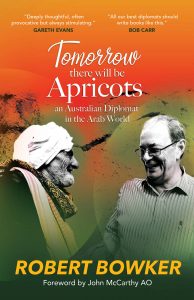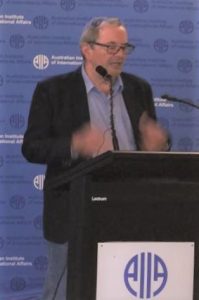An Australian Diplomat in the Arab World: Tomorrow there will be Apricots
On Tuesday 14th March 2023, the Australian Institute of International Affairs NSW welcomed Bob Bowker, former ambassador to Jordan, Egypt and Syria and Adjunct Professor at the ANU Centre for Arab and Islamic Studies, to discuss his new memoir, Tomorrow there will be Apricots: An Australian Diplomat in the Arab World. In his opening remarks he confirmed that the memoir’s title quotes the old Arabic proverb about wishful thinking, not too dissimilar to the phrase ‘pigs will fly’. He then gave insights and reflections, sprinkled with personal anecdotes, from his 37-year career as a diplomat in the Middle East.

Bowker revealed three key lessons from his experience in the Arab world. First, Middle East policy is not a morality play. He explained that politics is a part of life in the Middle East, with expediency – along with visceral emotion and moments of agitation – always shaping decisions. In this, he emphasised the importance of having a clear understanding of both the ends to be achieved and the means required for policy in the Middle East.
His second lesson was a pertinent reminder to be careful of our own value assumptions. The Middle East exposes how one’s assumptions may be a considerable distance from the complex reality that drives another society. ‘Shades of grey’ is a predominant characteristic when dealing with the region. To illustrate his point, Bowker said that Western misconceptions of youth protests in the Middle East conflate a desire for democracy with the actuality of humiliation under an oppressive regime.
In his final lesson he warned that in the Middle East issues invariably become more and more intractable. He elicited a wry laugh from the audience by declaring that the Middle East is a policy graveyard. But working on policy in the region was personally enriching albeit endurance testing. It was a reminder of the awkward space that can exist between policy advice and political decision-making, particularly in heterogeneous and contentious regions that test the values and intellectual honesty of advisors.
To conclude his address, Bowker drew attention to the present and future unpredictabilities of Arab political events. On resolving the Palestine-Israel conflict, he said he had been a long-standing advocate of a two-state solution but now supports a settlement for the conflict on the basis of a single state providing security and equality for Israelis and Palestinians alike. But he does not think that either side is at present prepared emotionally or organised ideologically to achieve this. On Australian policy in the Middle East, he said engagement must be grounded in a deep appreciation for the changing social, cultural and political dynamics of this complex region.
After Bowker’s address, AIIA NSW President Ian Lincoln declared Tomorrow There Will be Apricots launched in New South Wales. A question and answer session chaired by AIIA NSW Vice-President Thom Dixon followed.
Asked about the implications for Middle East power politics and the role of the United States of the recent discussions between Saudi Arabia and Iran brokered by China, Bowker noted that it is important to identify possibilities for constructive engagement, as sustained dialogue can reduce risks significantly. Taking on the role of a broker in the region necessarily came with an expectation that China would provide continuing support to ensure the deals it brokered came to fruition; it remained to be seen if China could be relied upon to provide this longer-term support. He added that that the United States is perceived widely in the region as a less reliable guarantor of its security than 20 years ago.
Asked about Australia’s policy toolbox to face the future, Bowker highlighted the imperative need to be consistent in Australia’s value applications across its foreign policy, particularly in insisting on the observance of international humanitarian law, an area where there is room for improvement. The United Nations Security Council’s voting record and seeking greater awareness of issues on the ground are key means with which to achieve these ends.
Bowker reminded the audience that credibility in foreign policy is paramount and this can only arise from consistency in the application of Australian values and identity.
Report by Isobel Logan, AIIA NSW Intern

Bob Bowker speaking to the AIIA NSW